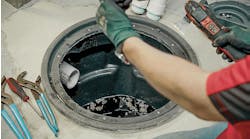“I don’t want my employees to be able to jump over the border for the weekend, smoke marijuana, and use the fact that it’s legal there as an excuse when they come to work on Monday.” That’s what Jerry Phillips, president of Design Comfort in Salt Lake City, Utah, had to say about legal recreational marijuana in Colorado.
Legal recreational use of marijuana was approved by Colorado voters in the last election, and went into effect Jan. 1, 2014. It is also legal in the state of Washington.
Despite legalization, use of recreational marijuana is still a hot topic of discussion both where it’s legal and where it’s not.
Scott Blashaw is service manager at Builders Heating in Denver, Colo. Blashaw knows that things have changed. Ironically, management tolerance of recreational marijuana use among employees is stricter. With legalization, the chances of being tested at Builders Heating are greater than before.
What is your opinion? Is the legalization of marijuana affecting your business? Tell us on our new Plumbing-Talk forum.
Blashaw explained, “We found that some of our employees thought that legalization meant that they were now free to use, either on their own time, maybe even at work. Maybe employment drug testing would go away. But it went the other direction here. We had an employee meeting and explained that of course what you do on your own time is your business. But we will start random spot checks. If you test positive, you will be let go.”
One of the biggest sources of concern with legal marijuana is testing. Drug tests are not like alcohol tests. Alcohol tests report blood alcohol at the moment — current impairment. Drug tests sense usage within an undetermined amount of time in the past. A person could have smoked on the weekend and still test positive days or weeks later.
Blashaw noted that even though the tests are not the same, the current type of drug test is what there is, so that’s what the company has to run with until there’s something better that measures current drug impairment.
“It’s a matter of employer responsibility," said Blashaw. "We work with some volatile stuff — gas, electricity, refrigerant. Put them together, and bad things can happen if you’re not careful. Add to that getting in a service vehicle and driving.”
From the legal eagle
Jared Kennard works for his family’s HVAC rep agency, Intermountain Sales Inc. of Salt Lake City, Utah. Kennard is also an attorney.
As might be expected, Kennard sees marijuana legalization from a safety and liability perspective.
“As for the liability of the contractor, it’s not much different from alcohol," said Kennard. "If a person drinks before going on the job and no one knows, it’s not a problem for the contractor. But if the contractor knows, he has to kick the guy off the job until he passes an alcohol test. And if there is an accident, there’s going to be questions about did the contractor know the employee was high or drunk.”
But again there are differences between testing for alcohol and for marijuana. Kennard echoes the ongoing debate about testing.
“It’s hard to detect when a person is currently high," said Kennard. "Current level of alcohol is measurable. You can’t tell the difference between THC in the blood now vs. in the past.”
Good for HVAC business
“It seems like every available space that used to be empty is now used for the pot business — medical marijuana dispensaries, retail recreational pot shops, or grow facilities," said Bladshaw. "Grow facilities are popping up everywhere, and they need HVAC.”
A positive effect of legal marijuana for the HVAC industry, Blashaw reports, is new work at facilities where marijuana is grown.
Many grow facilities did not know what they needed for HVAC, and much of what was installed needs to be fixed.
“Residential air conditioning and ventilation is commonly used to start off,” said Blashaw, “and it’s just not adequate. There are rooms like walk-in coolers that need AC year round. Yet the condensing units are designed for 70 degrees outside. The extreme contraction of the steel edging cuts into the copper, and there are leaks.”
Because of the marijuana plants, grow facilities have very high humidity. A principle of air conditioning is that it has to remove excess humidity before it can cool. Air conditioning can’t keep up until ventilation is addressed. It couldn’t be a better situation for an HVAC contractor.
The boss is still the boss
According to Kennard, one thing for sure does not change with legalization of recreation marijuana: the boss is still the boss. Regardless of whether substances are legal or not, be they alcohol or marijuana, the employer has the last say about employee work behavior and performance.
“It’s up to the employer to put in the terms of employment that an employee can’t show up for work impaired,” explained Kennard. “If the language says drink specifically, then pot doesn’t count.” But the rules are to be written about the employee behavior and performance, not substances.
“An employer should double check the work rules, and if they aren’t right for today, change the rules,” added Kennard. “The employer gets to do that.”
In fact, the employer is responsible for doing that.
“When marijuana is legal it’s like legal alcohol,” Kennard said. "If the work rules say you can’t be under the influence at work, you can’t, even if alcohol is legal, even if marijuana is legal. If you violate the rules, you’re wrong. Enforcement of work rules is up to the boss. The boss runs the company.”
Carol Fey is a technical trainer who has been in the HVAC industry for over 25 years. You can find her books at the Workplace Learning Center http://contractormag.com/catalog/hvac/hvac-electrical. To see her adventures while a heating mechanic in Antarctica, go to www.carolfey.blogspot.com.

